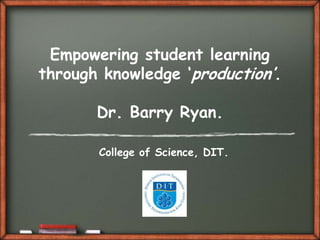
Empowering student learning through knowledge production
- 1. Empowering student learning through knowledge „production‟. Dr. Barry Ryan. College of Science, DIT.
- 3. Active „Producing‟ Students Students learning in groups Group Activities and Peer Learning Generic Skill development Reduced assessment load = ↑ Feedback Student Empowerment Learning Styles Ownership of learning
- 4. Active „Producing‟ Students Constructive Alignment: “....constructs meaning through the learning activities....” “....turn declarative into functional knowledge....”
- 5. Active „Producing‟ Students Constructive Alignment: Active and varied forms of learning mimicking the assessment. Regular, timely and constructive feedback.
- 6. Case study Module: TFQm3001 and TFME3003, Pharmaceutical Quality and Legislation (3rd Yr) Small class in small lecture room (Students: 12). All students were assumed to have little prior knowledge. One hour lecture, twice a week for a twelve week semester. No supplementary tutorials were provided.
- 7. Case study, In Class. Group activity = structured: 1. Activity 2. Group sizes 3. Time allowed 4. Outcomes Harold Jarche; “Life in perpetual beta” blog.
- 8. Case study, In Class. ACTIVE LEARNING Didactic Teaching “Chat time” Role Play Lecture Notes Mind Map Discussion
- 9. Case study, In Class.
- 10. Case study, In Class. Role play activity example: • Develop a role play for the following situation: You are a Pharmaceutical Scientist working for EMEA. You have been asked to give a short talk (5 mins) on the development of pharmaceutical legislation and outline the needs and future objectives of the legislation. All members of the group will help with drafting the role-play. One member will take the role of the Pharmaceutical Scientist. The other members will take the role of the audience members. The Pharmaceutical Scientist must address at least one (pre-prepared!) question from each of the audience members. Groups: 3-4
- 11. Case study, Inside and Outside Class. Epistemic processes Wondering Connection
- 12. Case study, Inside and Outside Class. Epistemic processes Conceptualistaton and Visualisation activity example: Review the first five objectives for the 2010 EU Pharmaceutical Legislation update. 1. Conceptualise and visualise the key points. 2. Convert the key points from each objective into a simple image. Groups: 3-4. Time: 20 mins. Note: Nominate one speaker from the group to describe the images to the class.
- 13. Case Study: Outside Class Epistemic processes 4 blogs/student/semester & 1 reflective piece. 500 words/blog; anytime, anywhere, Free choice; abstraction encouraged, Feed-back and –forward.
- 14. Case Study: Terminal Exam Aligned Assessment • Questions focused on the higher order skills: – analysis, – evaluation, – creation. • Aligned to the teaching methodology. • Exam = choice of questions(3 hrs). • Exam = 60% of overall grade.
- 15. Case Study: Terminal Exam Aligned Assessment Sample Question (focussing on imagination, creativity etc): You are employed as a R+D Scientist in medium sized pharmaceutical company and you have been assigned the job of discovering the company‟s new blockbuster drug (the choice of drug is up to you). Outline your decision making process as part of your initial discovery. Evaluate the pros and cons at each decision point. Note: Typical time allocated in an exam situation: 45
- 16. Active „Producing‟ Students Assessment is inescapable! Students are aware of this: “What influenced students most was not the teaching but the assessment” - Gibbs and Simpson (2004). “What do I have to do to pass”, or “is this topic/concept on the exam”, → Subtle changes can result in positive outcomes.
- 17. Active „Producing‟ Students Aligned in class tasks = activated and engaged the student. Change = passive consumers → purposeful producers. Blogs were the talk While in the groups, I could around the coffee table. give my own opinion and We would discuss ideas suggestions as well as for new blogs or share learning other ideas from my some ideas from the fellow classmates which I blogs in which we had wouldn’t have thought about learned while researching myself the topics for them.
- 18. Active „Producing‟ Students Blogs = natural progression from the in-class activities. A medium = students → creative and productive. – Independent thinking – Reflection, I found the blogs an interesting – Connection, method of learning. The research I carried out for each – Construction, blog stayed in my head, making the lectures more interesting – “Deep” learning and understandable. Blogging makes learning flat, not hierarchical (Segesten, 2011)
- 19. Active „Producing‟ Students Empowering Students. – Outline reasons – Learning styles, I became aware of my learning style...[as a visual learner and – Relevance, using concepts maps]...I was astonished as to how I was – Alignment, capable of understanding, and – Feedback. remembering, so much. → Ownership of learning..... Sage on the Stage → Guide by the side.
- 20. Active „Producing‟ Students. “If I could offer you only one tip for the future, sunscreen would be it” --- Baz Luhrmann “The long-term benefits of sunscreen have been proven by scientists, whereas the rest of my advice has no basis more reliable than my own meandering experience!!”
- 21. Active „Producing‟ Students Resistance: – Group Work + Mark Allocation, – Fear of Change, – „Comfort Zone‟, “The lecturer outlined how there was going to be a lot of group work throughout the course; the whole class cringed at that idea, including myself”
- 22. Active „Producing‟ Students. = Group work is not the “Silver Bullet” for Class engagement and participation. – Part of an integrated approach! • How to give “Group Work Credit”? • Logistical issues? Feedback, Classrooms etc.
- 23. Active „Producing‟ Students. Essentials: – Prior planning, – Stimulating, – Challenging, – Support, – Environment. “I believe I have learned more through discussing and evaluating questions and topics with my classmates during group work than a „regular‟ lecture”.
- 24. Active „Producing‟ Students. Acknowledgements: –DT480/3 Class Group. –Dr. Julie Dunne (Teaching Fellowship Colleague). –Learning, @CBS_Lecturer, Email: Barry.ryan@dit.ie Twitter: Teaching and Technology